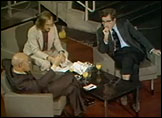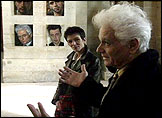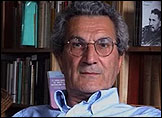Líneas de investigación
Proyectos en Curso
Proyectos Anteriores
 El pensar en movimiento, movimientos del pensar
El pensar en movimiento, movimientos del pensar  Thought in motion, movements of thought
Thought in motion, movements of thought
Thought in motion, movements of thought |
|
Direction: Pedro G. Romero, Santiago Eraso
PRESENTATIONPRESENTATION From Bergson to Wittgenstein, reflections on movement have had determining effects on the creation of new concepts of the world. Indeed, Heraclitus had already stated, "Upon those who step into the same rivers different and ever different waters flow down". Thought in motion is taken literally by Deleuze in his Cinema books, in which he declares the "auteur" film-makers to be the greatest philosophers of our time. It is not, however, a matter of considering cinema a philosophy, or even as a primary source of "examples", as Eugenio Trías or Slavoj Zizeck do with Hitchcock's filmography. It is a matter of approaching, from the focus of audiovisual media, certain ideas that, owing to their radical nature, have found in the movement of images a proper means of dissemination. We could say that, optimally, film has substituted the book in communicating certain things. Certainly, the debate on Human Nature: Justice or Power? between Noam Chomsky and Michel Foucault found in the format of television an essential medium through which to avoid ending in collision. The televised debate, moderated by Fons Elders and broadcast on Dutch Television in 1971, presents two paths of radical thought, and, politically radicalised, two roads that widely diverge. In the timing we also find the body language illustrating the attitudes underlining the differences between the reasoning, between the words, such as Chomsky's sardonic expressions and Foucault's sharp tongue. When Jacques Derrida is mentioned, one immediately envisions montage and demontage, film techniques that are a good approximation to what in philosophy is called deconstruction. One can see this in Woody Allen's noteworthy self-caricature in Deconstructing Harry. What Kirby Dick and Amy Ziering Kofman do with Derrida, presented in Spain at the 2002 Semici de Valladolid and in 2003 at the Madrid National Museum Art Center Reina Sofía and at the Barcelona Women's International Film Festival, is assimilate some of the film narrative techniques of documentaries to instruments that facilitate, from their speculative arsenal, Deconstruction, paradoxically capitalised, like the Academy of Philosophy that it is. When N de Negri was presented at the Barcelona Museum of Contemporary Art (MACBA), we understood the encyclopaedic value of this production by Carles Guerra. Spelled out in images, each fragment of the documentary, presented as Conversacions amb Toni Negri a cura de Carles Guerra, was a successful anatomical lesson of the political philosopher that Negri is and a magnificent thesaurus with which to dissect the entire period of thought that ensued in the aftermath of the late sixties revolution. Beyond the educational value of the documentary, what makes it a fabulous tool for thought is its function as hypertext; insert the CD of the Universal History of Philosophy and let its links and mechanisms roll. Thought in motion as seen through television, the movie theatre, the film library, the video player, the art gallery, the college class, the Internet, and more, or, better yet, thought flowing between spaces, moving between the times.
PROGRAMMEPROGRAMME
Wednesday, 8 October, 2003 The dialogue between linguist Noam Chomsky and philosopher Michel Foucault at the Eindhoven University of Technology's auditorium is the fourth in a series of debates between philosophers that were broadcast by Dutch Television and moderated by Fons Elders, with Professor Lolle W. Nauta presenting and commenting. The debate on Human Nature: Justice or Power? was organised around two questions. The first regarded speculative philosophy: Is human nature intrinsically determined, or is it a product of external factors? The dilemma of "justice before power" centres the second part of the debate: Is social revolution an event or a right? If the first, it is a matter of power, if the second, it is a matter of justice.
Presentation by:
What if you could watch Socrates, on film, rehearsing his Socratic dialogues? What if there was footage of Descartes, Thoreau, or Shakespeare as themselves at work and in their daily life? Might we now look at these figures differently, with perhaps a deeper understanding of their work and lives? Film-makers Kirby Dick and Amy Ziering Kofman asked themselves these questions, and decided to team up and document one of the most visionary and influential thinkers of the 20th century, a man who single-handedly altered the way many of us look at history, language, art, and, ultimately, ourselves: the brilliant and iconoclastic French philosopher Jacques Derrida.
N de Negri was filmed on 6 June, 2000 in Rome, at the home of Toni Negri. At the time Negri was under house arrest forcing him to sleep each night at Rebibbia prison. He jokingly said that during the day he was with his wife and then spent the night with his friends. Although he was sentenced until 2004, he was suddenly released in the spring of this year. The resulting 2 hour and 16 minute-video was organised like an alphabet. This structure produced a peculiar collision between the analytical notions of his work (such as "constituent power" or "subsumption") and the terms with which he maintains a vital relationship ("jail", "exile" and "exodus"). Over the video's two and one quarter hours, Negri weaves a vision of the 20th century and of the present rarely viewed with such analytical solidity, and more importantly, such optimism. Those who have seen the video cannot help but ask themselves how such a man could have been locked away in jail.
Presentation by: [All screenings will be open to any members of the public interested]
|
||||

 · 20:00 h.
· 20:00 h. · 20:00 h.
· 20:00 h. · 20:00 h.
· 20:00 h.